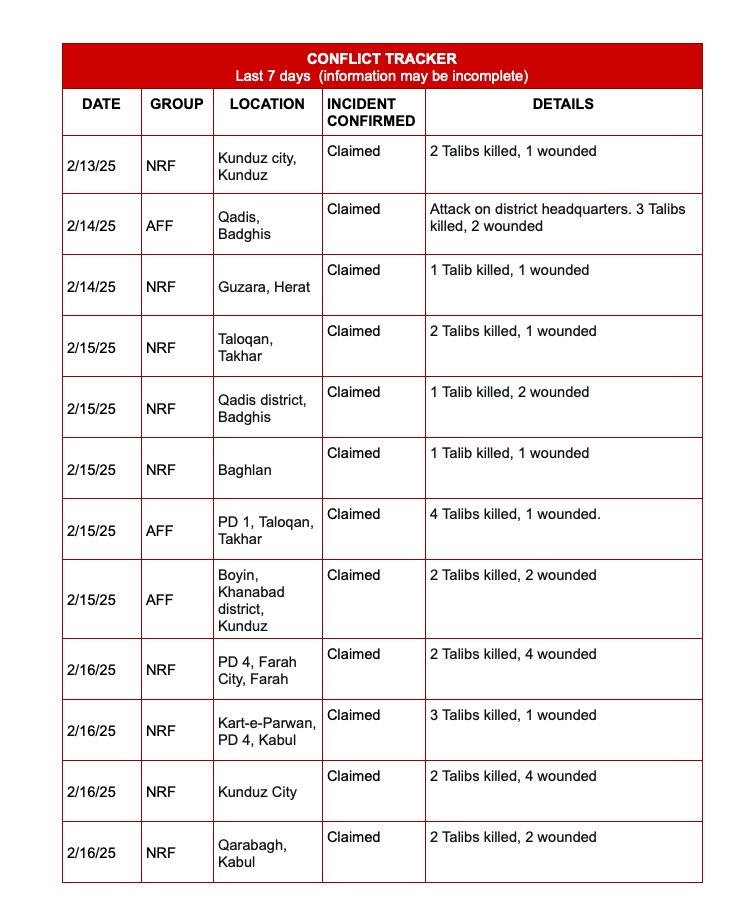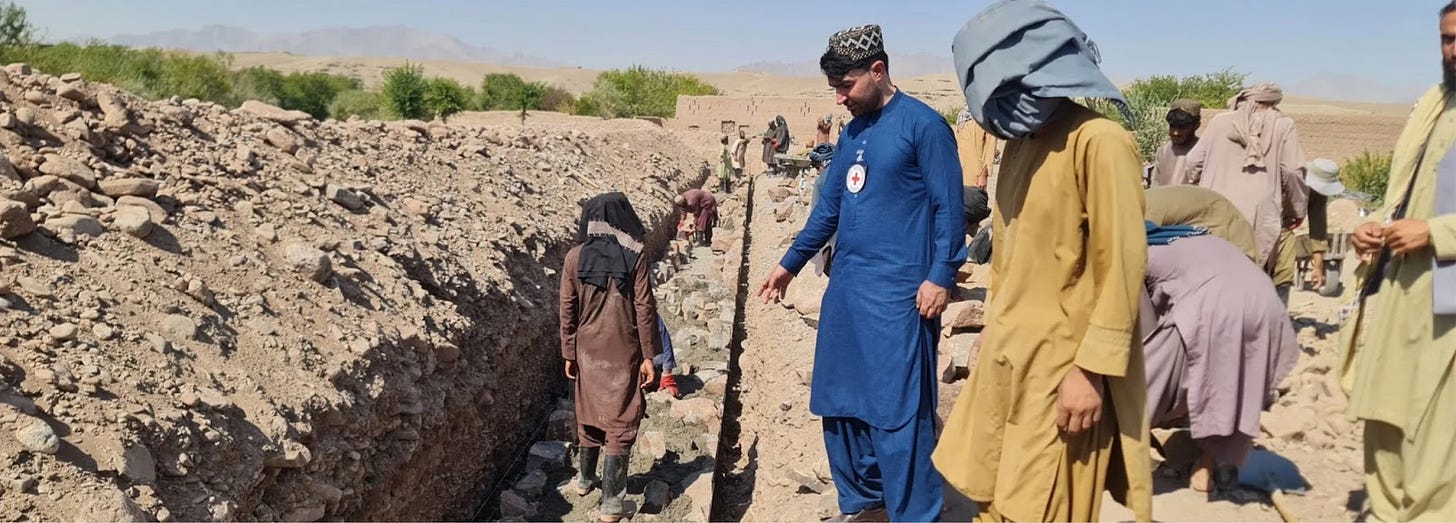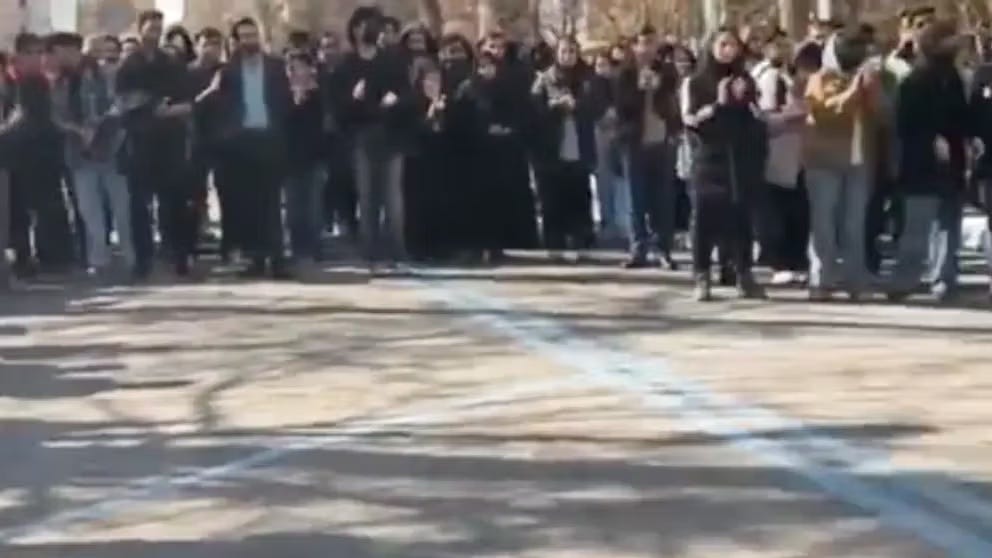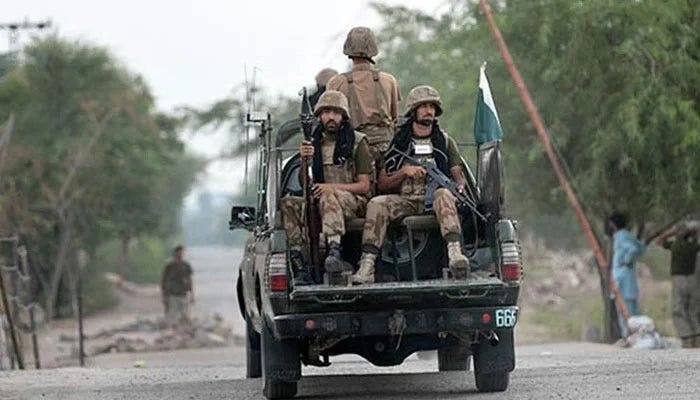The Week of February 10-16
Security and Conflict
Attack on Bank in Kunduz – On Tuesday at 8:35 AM, a suicide attack targeted a group of Taliban members gathering outside Kabul Bank in PD4, Kunduz city, to collect their salaries. The Taliban reported five deaths and seven injuries, but other sources estimate 15 to 40 killed and at least 30 wounded, most of them Taliban members. Among the confirmed fatalities were Shahab Salarzai, a Kunduz University professor, and Zakariya, a Taliban security commander. Last week, the Taliban had warned their members not to gather near banks for salary collection. ISKP claimed responsibility for the attack.
Ministry of Urban Development and Housing – On Friday around noon, a suicide bombing struck the Taliban’s Ministry of Urban Development and Housing in Kabul, killing at least two people and injuring six. Among the wounded was Deputy Minister Arsala Kharoti, who was taken to Emergency Hospital in critical condition, according to sources. Taliban spokesperson Mohammad Kamal Afghan stated that security forces intercepted the bomber at the entrance, preventing further casualties. The Taliban’s Ministry of Interior confirmed the attack but has yet to comment on Kharoti’s condition. ISKP has claimed responsibility for the attack.
Increase in Claimed Resistance Attacks – This week saw a sharp rise in claimed attacks by the NRF and AFF, particularly in the second half of the week. However, it is important to note that only one of these numerous claimed attacks has been independently confirmed—a Saturday attack in Taloqan, Takhar. It remains unclear whether the NRF or AFF was responsible for the incident.
Grenade Attack in Samangan – On Friday at 12:45 PM, a grenade attack at Jui Zindajan Mosque in Aybak, Samangan Province, injured at least four people during prayers, according to Taliban officials. The Taliban’s provincial police attributed the attack to a personal dispute rather than militancy. Two suspects were arrested while fleeing, and a shotgun was recovered.
Grenade Attack in Takhar – On Friday, an explosion targeted the Taliban’s Statistics Office in Taloqan, Takhar, after hand grenades were thrown at the building, according to local sources. The attack was allegedly carried out by anti-Taliban forces. No casualty details have been confirmed, and the Taliban have yet to respond.
Cross Border Skirmish – On Sunday, a border clash erupted between the Taliban and Pakistani forces in Lalpur, Nangarhar. According to Taliban spokesman Sayed Tayeb Hammad, Pakistani troops opened fire as the Taliban positioned an armored vehicle, prompting them to target two Pakistani posts in response. The two-hour skirmish resulted in no reported casualties.
Protests in Takhar – Since February 9, residents of Chah Ab, Takhar, have been protesting alleged gold mine plundering, accusing companies of environmental destruction. The recent arrival of excavators has intensified concerns over large-scale extraction. Similar activities have been reported in Badakhshan. Protesters warn of escalation if ignored, claiming authorities have not responded. The Taliban have yet to comment.
Four ISKP Members Arrested in Zabul – On Monday, Afghan security forces arrested four alleged ISKP affiliates in Nowbahar district, Zabul, seizing heavy weapons. Pro-Taliban sources confirmed the arrests, but no official Taliban statement has been issued. Unlike previous lethal operations, recent Taliban actions favor arrests, raising doubts about whether the detainees are genuine ISKP members. Taliban spokesman Zabihullah Mujahid claimed ISIS is severely suppressed in Afghanistan. His remarks coincide with a UN Security Council meeting on ISIS threats.
Human Rights and Civil Liberties
Activist Killed – On Sunday, Hamza Olfat, a 31-year-old activist from Daikundi, was arrested by the Taliban for allegedly assisting individuals linked to the Balkhab conflict—an uprising of mainly Shia Hazaras led by Mehdi Mujahid in Sar-e Pul in June 2022. After serving a prison sentence, he remained under surveillance and attempted to reunite with his family. While traveling through Daikundi, he was shot and later died due to blood loss and cold.
Activist Arrested – On Tuesday, Taliban intelligence arrested social activist Shafiullah Atayi in Khair Khana, Kabul. His fate remains unknown, and the reason for his arrest is unclear. His family denies any links to anti-Taliban groups. Shafiullah was previously jailed for six months.
Taliban Prevent Delegates from Traveling to Conference – On Tuesday, the Taliban barred 14 individuals, including two women, from traveling to Doha for the Afghanistan Future Thought Forum. Some were forced off a FlyDubai aircraft, while others were prevented from boarding Air Arabia. Sources link the move to women’s participation and internal Taliban power struggles. Only Jafar Mahdawi was allowed to travel. The forum aims to analyze Afghanistan’s challenges.
Floggings – On Monday, seven people were flogged in Kunduz, Uruzgan, and Ghazni. On Tuesday, one person was flogged in Paktika. On Wednesday, a woman was flogged in Ghazni. On Sunday, one man was flogged in Bamiyan and eleven were flogged in Nimruz.
Internal Politics
Ministry Reshuffling – On Wednesday, The Taliban announced six new appointments and reshufflings, involving deputy ministers and provincial officials. Mawlawi Obaidullah Aminzada, former Takhar governor, is now Deputy Minister of Social Affairs at the Ministry of Labor and Social Affairs. Sheikh Zia-ur-Rahman Aryobi, previously a deputy minister at the Ministry of Mines and Petroleum, has been appointed Academic Deputy Minister at the Ministry of Higher Education. Sheikh Abdul Rahman Qanet, formerly Director of Supervision at Afghanistan’s Central Bank, is now Deputy Minister of Planning and Policy at the Ministry of Mines and Petroleum. Mawlawi Samiullah Hizbullah, ex-Kandahar police chief, is the new Governor of Takhar, while Mawlawi Abdul Ahad Talib, former Helmand governor, is now Kandahar’s Chief of Police. Lastly, Lutfullah Khairkhwa, formerly Academic Deputy Minister of Higher Education, has been reassigned as Director of Supervision at the Central Bank of Afghanistan.
Taliban Discourage Recruitment Agencies from Issuing Foreign Work Visas – The Taliban have ordered Kabul travel and recruitment agencies to stop processing work visas for Afghans seeking jobs abroad, citing efforts to curb the "illegal transfer of labor." Minister Abdul Manan Omari stated that a structured system will be established to regulate labor migration. The decision comes amid Afghanistan’s worsening economic crisis.
Possible Internal Rifts – This week, Taliban Foreign Minister Amir Khan Muttaqi indirectly criticized power centralization under Mullah Hibatullah, calling for internal unity. His remarks followed Abbas Stanikzai’s escape to the UAE after denouncing the Taliban’s ban on women's education as un-Islamic. Mullah Hibatullah had ordered his arrest, but he fled with help from Taliban officials. Internal rifts reportedly continue to grow, though little actual evidence of divisions is present.
International Developments
UN Security Council Meeting on IS Threat – On Monday, the UN Security Council convened to discuss ISIS-K, with global representatives expressing concerns about the group's growing threat in Afghanistan, Central Asia, and beyond. UN counterterrorism chief Vladimir Voronkov and Denmark’s envoy Christina Marcus Lassen warned of ISIS-K’s resilience despite counterterrorism efforts. U.S. Deputy Ambassador Dorothy Shea identified ISIS recruitment in Afghanistan and Pakistan as a major issue. Russia’s envoy, Vasily Nebenzya, claimed that NATO weapons left in Afghanistan had fallen into ISIS hands, while reports confirmed the continued entry of foreign fighters into the country. China’s representative, Fu Cong, urged the Taliban to dismantle all terrorist organizations, including ETIM, ISIS, and al-Qaeda. Pakistan’s envoy, Munir Akram, called for stronger counterterrorism measures, alleging foreign support for terrorist groups. The UN Secretary-General reiterated the need for global cooperation to prevent Afghanistan from becoming a terrorist hub. The associated report can be accessed here
Mike Pompeo Speaks On Doha Agreement – On Tuesday, former U.S. Secretary of State Mike Pompeo confirmed that the Doha negotiations were conducted at Trump’s request to withdraw U.S. troops. Two agreements were signed: one pressuring the Afghan government to negotiate and another setting conditions for the Taliban. Trump later criticized Biden’s withdrawal, calling it "disastrous." The August 2021 U.S. exit led to the Afghan government’s collapse, Taliban rule, and worsening human rights conditions, especially for women. The full article can be accessed here
Lawsuit Filed Challenging Pause to Refugee Resettlement – On Monday, a coalition of U.S. refugee advocacy groups filed a lawsuit in Washington, D.C., challenging President Trump’s suspension of the refugee resettlement program. The suit argues that Trump exceeded his authority, causing irreparable harm to refugees. The freeze left tens of thousands of Afghans, including 1,660 already approved for resettlement, in limbo. A Congolese family’s relocation was abruptly canceled, leaving them stranded. The order halted foreign aid and refugee admissions, raising concerns for Afghans facing Taliban reprisals. The lawsuit also challenges funding cuts to refugee assistance groups, urging the court to restore U.S. refugee protections. A statement on the lawsuit can be accessed Here. Despite the legal challenge, U.S. flights for refugees and SIVs from Afghanistan remain paused, and resettlement benefits remain unavailable.
Doha Conference on Drug Control in Afghanistan Held – High-level talks on drug control and Afghanistan’s economy, originally planned for Qatar, were held virtually on February 12-13 due to Qatar’s lack of preparedness, sources said. As part of the Doha process, the meetings included representatives from Iran, Russia, the U.S., the EU, China, South Korea, Qatar, and the Taliban. Pakistan reaffirmed its support for Afghanistan’s anti-drug efforts.
Fifth Vienna Conference to Be Held Next Week – The fifth Vienna Conference on a Free and Democratic Afghanistan will take place in Austria next week, bringing together political groups, activists, and opposition figures to discuss Afghanistan’s post-Taliban future. Over 50 political groups will participate, with a focus on political unity. The Vienna Process remains the primary platform for anti-Taliban political and military opposition.
Freedom of the Press
Ban on Political Programs – The Taliban have ordered Afghan private media to stop airing political programs, warning of serious consequences for violations. The restriction, issued on Thursday, remains in effect until further notice. A meeting with media officials is scheduled for Saturday, but the ban's duration remains unclear. The Taliban continue to tighten media restrictions and suppress press freedom.
Regional Developments
Pakistan Accuses Taliban of Harboring TTP After 22 Cross-Border Attacks – In a letter dated July 2024 but released this week by Talib Leaks, Pakistan’s Foreign Ministry informed the Taliban embassy in Islamabad that TTP militants launched 22 attacks from Afghanistan between June 16 and 30, 2024. Pakistan claims TTP leaders operate from Afghan provinces and has urged the Taliban to take action. The Taliban embassy has forwarded the complaint to Kabul. Pakistan has repeatedly accused the Taliban of sheltering TTP, a charge the Taliban deny.
Turkey Deports Migrants – OOn Monday, Turkish police detained 24 Afghan migrants hiding in a truck carrying tires from Russia after stopping it in Amasya. The driver was also arrested. In a separate case, five Afghan migrants were found in a cargo truck in Tokat. All detainees were sent to deportation centers as Turkey continues its crackdown on undocumented migrants.
Russia Not Rushing to Recognize Taliban – On Wednesday, nearly a year after pledging to remove the Taliban from its terrorist list, Russia indicated that the process remains lengthy and complex. Deputy Foreign Minister Andrei Rudenko emphasized that Moscow is in no rush to recognize the Taliban, underscoring ongoing diplomatic caution.
Uzbekistan Seizes Drugs – On Monday, Uzbekistan’s National Security Service seized 600 kg of narcotics worth $16.5 million, allegedly originating from Afghanistan. The drugs were hidden inside broom handles and intercepted at the Surkhandarya border checkpoint. A suspicious truck carrying 13.5 tons of brooms was stopped, revealing the concealed drugs. Authorities have launched an investigation into the trafficking attempt.
Miscellaneous
Heavy Snow Blocks Transit Routes – On Monday, heavy snowfall blocked roads in six Afghan provinces: Maidan Wardak, Bamyan, Ghor, Daikundi, Sar-e-Pul, and Faryab, according to the Taliban’s Ministry of Public Works. Key routes in these areas remain closed. The snowfall, affecting central and western regions, has disrupted transportation. Authorities have not yet provided a timeline for reopening the roads.
NEXT WEEK
House-to-house searches, particularly in Islamabad and Rawalpindi, will continue for the foreseeable future. Raids have also started and are likely to continue in Balochistan, specifically Quetta and Kachlak. All Afghans are urged to maintain compliance with visa and No Objection Certificate requirements. Raids, including night raids, will also continue.
Afghans in Iran are reminded to avoid protests and large gatherings. Deportations from Iran continue, and those caught participating in protests risk violence, detention, and deportation. Be aware of your surroundings and exercise caution at all times. Those with ties to the former government should use extreme caution if deported from either Iran or Pakistan, as they are particularly vulnerable to detention by the Taliban upon return.
Following a particularly violent week in Afghanistan, checkpoints, detentions, and raids are likely to be conducted in search of ISKP operatives. These will primarily take place in northern cities and Kabul. These operations are also likely to target former government officials and those suspected of ties to resistance forces under the guise of counterterrorism arrests. Attacks by ISKP may continue in the lead-up to Ramadan, which is expected to begin around February 28 or March 1. There is also a possibility of increased attacks by resistance forces in the leadup to Ramadan.
In the U.S., for the foreseeable future, all Afghans should be aware of their legal rights regarding ICE enforcement and ensure they carry proper documentation at all times. New resources are available to assist those in the U.S. with parole and can be accessed here, for recent SIV arrivals here, and for recent refugee arrivals here. Those with issued SIVs are able to self-fund travel to the U.S. at this time but should be aware that pauses in resettlement benefits, due to staffing cutbacks, mean that no assistance will be provided for securing housing or completing forms necessary to access medical care, food benefits, or school enrollment for children. Assistance from friends and family in the U.S. will be required when relocating.
REGIONAL ROUNDUP
IRAN
Afghan Deportations – Iranian authorities arrested 172 undocumented Afghan migrants in Zabol, Sistan and Baluchestan, as part of a security crackdown. Additionally, 250 migrants stranded at the border were rescued and deported. Iran has intensified deportations, expelling over 300,000 Afghans from Tehran since March 2023. Authorities have also warned employers against hiring undocumented migrants.
700 Afghan Owned Businesses Closed – Iranian authorities have sealed 700 Afghan-run businesses on Qeshm Island as part of a crackdown on undocumented migrants, the island’s chief prosecutor announced. Under Iranian law, property transactions with undocumented foreigners are prohibited. This move is part of Iran’s Organizing Undocumented Foreign Nationals campaign. Meanwhile, Iran and Pakistan continue to detain and deport Afghan migrants daily, sparking criticism from human rights organizations.
PAKISTAN
Afghans Killed in North Waziristan – On Tuesday, security forces killed four terrorists, allegedly including three Afghans, and injured three others in North Waziristan following intelligence reports of militant presence in Tappi village, Miramshah. Separately, five TTP militants were killed in Karak district. Some bodies were unrecognizable due to fire. A search operation is ongoing, but no official military statement has been issued.
Health Clinics Serving Afghan Migrants to Close – The UN warned that 1.2 million Afghan refugees in Pakistan will be affected by the suspension of U.S. aid, leading to the closure of 60 health facilities. Additionally, UNFPA reported that around 9 million Afghan refugees across neighboring countries will face hardships due to the funding halt.
Jirga Demands Release of Kidnapped Workers – On Thursday, the Marwat Qaumi Jirga set a three-day deadline for the release of 16 abducted government workers linked to the Pakistan Atomic Energy Commission in Lakki Marwat, Khyber Pakhtunkhwa. The workers were kidnapped on January 9 by the Pakistani Taliban, who claimed responsibility and released a video of the captives. The hostages were ambushed, their vehicle burned, and taken at gunpoint. The jirga warned that if security forces fail to act, locals will take matters into their own hands.
Four Army Personnel Killed – On Saturday, four Pakistani soldiers were killed during an operation in Miranshah, North Waziristan, while the Pakistani army reported killing six militants. The Hafiz Gul Bahadur group claimed responsibility for the attack. Hafiz Gul Bahadur, a former Tehrik-i-Taliban Pakistan (TTP) commander, later split from the group and now operates independently. In response, Pakistan summoned the Taliban ambassador in Islamabad, demanding Bahadur’s arrest and extradition, alleging he operates from Afghanistan—a claim the Taliban deny.
SPOTLIGHT ANALYSIS
Pakistani and Tajik Taliban open training camps in Afghanistan
Bill Roggio
The Movement of the Taliban in Pakistan (TTP) and Jamaat Ansarullah (JA) have established training camps in Afghanistan with support from Al Qaeda and the Taliban, the United Nations Analytical Support and Sanctions Monitoring Team reported. These camps are in addition to the facilities that are operated by Al Qaeda and have previously been identified by the Monitoring Team.
The Monitoring Team disclosed the presence of new TTP and JA training camps in the provinces of Khost, Kunar, Nangarhar, Paktika, and Takhar, as well as the existence of two foreign jihadist units in its latest 1267 report on Afghanistan issued on February 13.
Al Qaeda and its jihadist allies are now running facilities in 14 of Afghanistan’s 34 provinces. In previous reports, the Monitoring Team identified Al Qaeda camps operating in 12 of Afghanistan’s 34 provinces.
The most recent and previous Monitoring Team reports directly contradict the Taliban’s repeated claims that it does not harbor or support foreign terror groups. The TTP routinely launches attacks in Pakistan, while JA is devoted to overthrowing the Tajik government. Al Qaeda remains a transnational terror group that supports jihad across the globe.
AFGHAN NEWS
Afghanistan: 2024 Operational facts and figures
ICRC
In 2024, communities in Afghanistan continued to face significant challenges to access basic necessities such as healthcare, food and clean water. The humanitarian situation in the country remains extremely dire as a result of decades of armed conflict, economic hardship and natural disasters.
The International Committee of the Red Cross (ICRC) worked to respond to humanitarian challenges across Afghanistan by supporting healthcare, providing physical rehabilitation services, assisting people in establishing livelihoods and incomes, and improving access to clean water, sanitation and energy.
Afghanistan Falls Three Spots in Global Corruption Ranking
Najibullah Lalzoy
Afghanistan scored 17 out of 100 on the organization's Corruption Perceptions Index (CPI), which is three points lower than its 2023 score.
According to the report, Afghanistan scored 17 out of 100 on the organization's Corruption Perceptions Index (CPI), which is three points lower than its 2023 score. The country had previously scored 20 in 2023 and 24 in 2022.
In this index, a score of 100 indicates the absence of corruption in the public sector, while a score of zero represents widespread corruption. The report places Denmark (90 points), Finland (88 points), and Singapore (84 points) at the top of the ranking, while South Sudan (8 points), Somalia (9 points), and Venezuela (10 points) are at the bottom.
Report warns Afghanistan faces 7% economic decline amid US aid cuts
Bais Hayat
Afghanistan is expected to suffer a 7% economic setback due to reduced U.S. aid, according to a new report by the Center for Global Development (CGD).
The report identifies Afghanistan as one of eight countries most dependent on U.S. assistance, with more than one-fifth of its foreign aid coming from the U.S. Agency for International Development (USAID). Prior to the cuts, USAID accounted for 35% of all international aid to Afghanistan.
REGIONAL NEWS
Protests persist over death of Iranian university student
Iran International
Protests over the death of a 19-year-old University of Tehran student continue to intensify, as others gathered in front of the university's central library on Saturday amid reports of a heavy security presence on the main campus.
Amir Mohammad Khaleghi, an undergraduate in business management, was fatally attacked by robbers with a cold weapon near the university dormitory on February 13. The victim died from his wounds in hospital. The incident has sparked widespread anger among students, who accuse university officials of failing to ensure their safety.
Security forces kill seven Khwarij in DI Khan, North Waziristan
The Pakistan Daily
Security forces have killed seven Khwarij during intelligence-based operations in Dera Ismail Khan and North Waziristan Districts of Khyber Pakhtunkhwa province.
According to ISPR, the security Forces conducted an intelligence-based operation in general area Maddi, Dera Ismail Khan District on reported presence of the Khwarij.
During the conduct of operation, own troops effectively engaged the Khwarij location, as a result of which, three Khawarij, including Kharji Rehmat, were killed, while two Khwarij got injured.
INTERNATIONAL NEWS RELATING TO AFGHANISTAN
Munich car attack suspect: What we know about Afghan bodybuilder and asylum-seeker Farhad Noori
Alex Croft
An Afghan bodybuilder with thousands of online followers was arrested after a car was driven into a Munich crowd on Thursday.
At least 36 people were injured, two of whom were left fighting for life after a Mini Cooper was rammed into a group of trade union strikers on Seidlstrasse at around 10:30am.
German police believe the attack may have been motivated by Islamist extremism, they said on Friday morning. The alleged attacker admitted to deliberately ramming into the crowd, police added in a press conference.
Anti-terror police in Germany are investigating the incident, and the suspect has been named as Farhad Noori by the Munich prosecutor’s office.
US deports 119 migrants, including Afghans, to Panama
Siyar Sirat
A U.S. deportation flight carrying 119 migrants, including individuals from Afghanistan, arrived in Panama this week, marking the first transfer under a new agreement in which the Central American nation serves as a stopover for repatriations, President José Raúl Mulino said Thursday.
“Yesterday, a U.S. Air Force flight arrived with 119 people from diverse nationalities,” Mulino said at a press briefing, noting that the group included migrants from Afghanistan, China, Uzbekistan, and Pakistan.
The flight was the first of three planned under the arrangement, which is expected to facilitate the deportation of about 360 people in total. Mulino downplayed the scale of the effort, calling it “not something massive.” The migrants will be housed in a shelter in Panama’s Darién region before being repatriated to their home countries, he said.
Afghans who helped US fight Taliban left in limbo by Trump policy
Llazar Semini, Farnoush Amiri, and Munir Ahmed
They helped the U.S. military order airstrikes against Taliban and Islamic State fighters and worked as drivers and translators during America’s longest war. They were set to start new lives in the United States.
Then President Donald Trump issued executive orders that put an end to programs used to help Afghans get to safety in America. Now those same Afghans, who underwent a yearslong background check, find themselves in a state of limbo.












